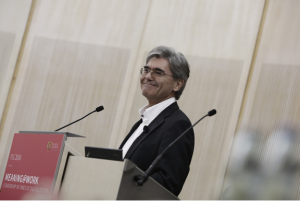The Highlights of our Thought Leader Interview with Infineon CEO Dr. Reinhard Ploss
on Leadership and the Rise of Intelligent Machines
Dr. Reinhard Ploss has been in the business of microelectronics for more than three decades. When he started his business career after having received his doctorate in process engineering in 1986, the internet was just taking-off. During his time as an industry leader, technology has fundamentally changed economy and society at increasing speed.
Dr. Reinhard Ploss is one of 25 global thought leaders, who the research team of the Future of Leadership Initiative interviews to gain a profound understanding of this year’s focus topic: “Yes, Mr. Robot!” – Leadership and the Rise of Intelligent Machines.” This article presents a concise overview of the interview highlights.
There is also a long version of the article that provides deeper insights as well as reflection questions so you can translate the insights to your personal leadership practice.

ABOUT DR. REINHARD PLOSS
Here are the key messages from the interview
1. THE HIGHER PURPOSE OF INTELLIGENT MACHINES
When asked whether the rise of intelligent machines is mainly a development for its own sake or whether there is an essential, higherpurpose behind all the investments, Dr. Ploss makes a thoughtful pause: ““There is one fundamental contradiction today”, hestates, “almost nine billion people live on our planet. Most of them should have the chance to experience a similarlyhigh standard of living as we do. Only intelligent applications can help us achievethis without further destroying our natural resources.”
KEY TAKE AWAY 1
Machine Intelligence can and should be used to help humans leveling-up the global standard of living without destroying the natural resource base.
2. THE DANGER OF A MONOCHROME SOCIETY
According to Dr. Ploss, the fact that it is almost impossible for a normal user to understand the decision process of an intelligent algorithm combined with the tempting convenience of intelligent systems bears high potential for unconscious manipulation. Many users are not aware to what degree their online decision-making is driven by an AI. At the same time, the convenience provided by AI systems is just too tempting: “Why do people use Google? Because it delivers the best results. You have to ask yourself: Where do I pay by this convenience?” Reinhard Ploss reminds us. In the long run, this could bear the risk of an increasingly monochrome behavior based on dominant algorithms. “The world today is working because it is colorful. We have to avoid monochrome, overly optimized systems”, the CEO states.
KEY TAKE AWAY 2
The human tendency for convenience can lead to an inadequate power for those who own the best data and algorithms on the providers' side, and to monochrome behavior on the customer's side.
3. THE NEED FOR MORAL LEADERSHIP
“Artificial Intelligence is just as good as it is trained”, Reinhard Ploss states. “It is biased by the data you provide and by the mindset of the people that have programmed the algorithms.” The implementation of machine intelligence demands a high level of consciousness and moraljudgmentregarding the possible consequences of relevant algorithms. Individuals, but also companies have to make conscious decisions on how much data they generate and provide to others. This is a vital leadership task and leadership has to find clear answers about the do`s and don`ts.
KEY TAKE AWAY 3
The purpose of leadership is to ensure and foster moral judgments how to develop, train, and use intelligent machines.

ABOUT THE PROJECT
4. NEW SKILLS NEEDED: “FUSION THINKING”, CURIOSITY, AND EXPLORATION
How can leadership prepare everyone for working with intelligent machines? Dr. Ploss demands a “fusion thinking between technology and business.” The opportunities and challenges of machine intelligence require a high level of interdisciplinary understanding, collaboration, and mutual learning. Anybody in the business who requires a digital solution should be able to understand the logic behind AI and the possible ethical consequences, use cases, and algorithms.
KEY TAKE AWAY 4
Everybody should have basic knowledge about
how intelligent machines think and process data.
To enable the new skill of “fusion thinking”, corporate leadership should stimulate curiosity and fascination for the topic, openand honest debates as well as best practice sharing. For Reinhard Ploss,exploratory thinking starts with open-mindedness. It means entering a process with curiosity and feeling encouraged to speak out what they do not know (yet). Then searching for answers together. Be willing to take a step back. Experiment and reflect. Use moral judgment. Create knowledge as you learn. And with this knowledge start the process again. This iterative approach can help to master things for the better.
KEY TAKE AWAY 5
Curiosity and using an explorative approach will become important individual capabilities.
5. THE VALUE OF NOT KNOWING
With increasingly complex technological systems that exceed human understanding, the ability to cope with the unknown will become more and more important. Today, many people, especially in leadership positions, perceive „not knowing” as a threat. But it always has been the unknown that provided the potential for innovation and improvement. To intentionally appreciate the unknown unleashes curiosity and creativity. “There is a fundamental insight in valuing the ‘not knowing’,” Ploss summarizes at the end of our meeting.
KEY TAKE AWAY 6
There is a value of "not knowing" that as to be intentionally appreciated.
6. IS OUR SOCIETY MOVING TOWARDS A CHAOTIC SYSTEM?
Well, this point clearly has its roots in Dr. Ploss’ education as a physicist and requires a few more words to explain… So, make sure to download the long article for free ;).





